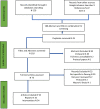The use of pasung for people with mental illness: a systematic review and narrative synthesis
- PMID: 33372617
- PMCID: PMC7720453
- DOI: 10.1186/s13033-020-00424-0
The use of pasung for people with mental illness: a systematic review and narrative synthesis
Abstract
Background: Pasung is the term used in Indonesia and a number of other countries for seclusion and restraint of people with mental illness in the community, usually at home by their family. While pasung has been banned because it is contrary to human rights, its practice continues to exist within the community, particularly where community mental health services are limited, and in the absence of adequate social support, and pervasive negatives beliefs about mental illness. It is essential to understand the reasons for the ongoing use of pasung and to examine potential solutions.
Methods: A systematic review and narrative synthesis of peer-reviewed international literature was conducted to identify the socio-cultural contexts for pasung use, and interventions to address it. The analysis draws on the socio-ecological framework, which focused on relationships between the individual and their environment.
Result: Fifty published articles were included in the review; all studies were conducted in Asia and Africa, with 32 undertaken in Indonesia. Most studies were qualitative (n = 21). Others included one case-control study, one cross-sectional study, and seven surveys; only four studies examined the application of an intervention, and each used a pre and post methodology. Of these, two studies tested psychoeducational interventions which aimed to overcome family burden due to pasung, and each suggested a community mental health approach. The remaining two studies evaluated the intervention of 'unlocking'; one study used a community-based culturally sensitive approach, and the other used a community-based rehabilitation program. Reasons for pasung given by family appear to be as a last resort and in the absence of other supports to help them care for the person with severe mental illness.
Conclusion: The findings highlight that a mixture of individual, interpersonal, community and policy interventions are needed to reduce the use of pasung. While consumer and carer involvement as part of a socio-ecological approach is understood to be effective in reducing pasung, an understanding of how to elaborate this in the management of pasung remains elusive. Review Registration CRD42020157543: CRD.
Keywords: Community mental health; Human rights; Lived experience; Narrative synthesis; Pasung; Restraint; Systematic review.
Conflict of interest statement
The authors declare that they have no competing interests.
Figures
Similar articles
-
Indonesia free from pasung: a policy analysis.Int J Ment Health Syst. 2023 May 3;17(1):12. doi: 10.1186/s13033-023-00579-6. Int J Ment Health Syst. 2023. PMID: 37138360 Free PMC article.
-
Evaluating the Indonesia Free Pasung Movement: Understanding continuing use of restraint of the mentally ill in rural Java.Transcult Psychiatry. 2023 Jun;60(3):552-565. doi: 10.1177/13634615211009626. Epub 2021 May 9. Transcult Psychiatry. 2023. PMID: 33966503
-
Beyond the black stump: rapid reviews of health research issues affecting regional, rural and remote Australia.Med J Aust. 2020 Dec;213 Suppl 11:S3-S32.e1. doi: 10.5694/mja2.50881. Med J Aust. 2020. PMID: 33314144
-
Systematic reviews of the effectiveness of day care for people with severe mental disorders: (1) acute day hospital versus admission; (2) vocational rehabilitation; (3) day hospital versus outpatient care.Health Technol Assess. 2001;5(21):1-75. doi: 10.3310/hta5210. Health Technol Assess. 2001. PMID: 11532238 Review.
-
Coercion (pasung) and people with a mental disorder in Indonesia: Bioethics and health law.Int J Law Psychiatry. 2019 Sep-Oct;66:101477. doi: 10.1016/j.ijlp.2019.101477. Epub 2019 Oct 21. Int J Law Psychiatry. 2019. PMID: 31706376 Review.
Cited by
-
Pasung: A qualitative study of shackling family members with mental illness in Indonesia.Transcult Psychiatry. 2023 Jun;60(3):566-576. doi: 10.1177/13634615221135254. Epub 2022 Nov 24. Transcult Psychiatry. 2023. PMID: 36420753 Free PMC article.
-
Perceived causes of mental illness and views on appropriate care pathways among Indonesians.Int J Ment Health Syst. 2021 Sep 23;15(1):74. doi: 10.1186/s13033-021-00497-5. Int J Ment Health Syst. 2021. PMID: 34556137 Free PMC article.
-
Unlocking the mentally ill in Indonesia: An empirical study of the effectiveness of a "Bebas Pasung" program in Central Java.PLoS One. 2024 Oct 18;19(10):e0302190. doi: 10.1371/journal.pone.0302190. eCollection 2024. PLoS One. 2024. PMID: 39423171 Free PMC article.
-
Culturally adapted family intervention for people with schizophrenia in Indonesia (FUSION): a development and feasibility study protocol.Pilot Feasibility Stud. 2023 Mar 30;9(1):53. doi: 10.1186/s40814-023-01280-8. Pilot Feasibility Stud. 2023. PMID: 36998003 Free PMC article.
-
Indonesia free from pasung: a policy analysis.Int J Ment Health Syst. 2023 May 3;17(1):12. doi: 10.1186/s13033-023-00579-6. Int J Ment Health Syst. 2023. PMID: 37138360 Free PMC article.
References
-
- Hert M, Dirix N, Demunter H, Correll C. Prevalence and correlates of seclusion and restraint use in children and adolescents: a systematic review. European Child Adol Psychiatr. 2011;20:221–230. - PubMed
-
- Suryani LK, Lesmana CBJ, Tiliopoulos N. Treating the untreated: applying a community-based, culturally sensitive psychiatric intervention to confined and physically restrained mentally ill individuals in Bali. Indonesia. Europ Arch Psychiatr Clin Neuroscience. 2011;261:140–144. - PubMed
Publication types
LinkOut - more resources
Full Text Sources


